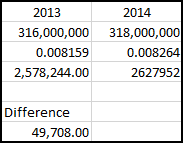ImBillT
Well-known member
- Joined
- Oct 29, 2018
- Messages
- 3,943
This is probably what you are looking for then.
Okay, we have a vaccine now. I’m not sure the numbers are all that encouraging. One vaccine claims that it’s 95% effective at preventing severe illness. Weren’t only about 95% of illnesses sever even before that vaccine? The latest vaccine claims its 76% effective at preventing symptomatic illness. Didnt early data suggest that about 85% of infections were asymptomatic before the vaccine?
I’m not convinced that the masks have been proven have any real utility in preventing viral respiratory illness in the long term, and I am convinced that the older I am when I catch covid-19 the worse off I’ll be.
I’ve already had it anyway. My whole family caught it while I was out of town on a hunt, and I caught it from them shortly after I returned. It’s unclear whether my wife caught it from my mother, who was very careful and works for an eye surgeon, or if she caught it from a coworker where they are both required to wear a mask.
It may be further reduced if the only encounter with the virus is a single exposure of limited duration with foreknowledge of the encounter. What I don’t buy, is the idea that someone can possibly implement an effective protocol for an entire year of interaction with humanity. Reduced risk implies that there is still risk. When you have multiple encounters, every day, for an entire year, eventually you almost certainly catch it, mask or not. If we cut cases dramatically, then we still lack immunity, so instead of needing to be perfect for one year, we need to be perfect for two years, or three, or twenty.
Still Confused About Masks? Here’s the Science Behind How Face Masks Prevent Coronavirus
We talked to UCSF epidemiologist George Rutherford, MD, and infectious disease specialist Peter Chin-Hong, MD, about the CDC’s reversal on mask-wearing, the current science on how masks work, and what to consider when choosing a mask.www.ucsf.edu
If either person is wearing a mask risk is reduced, if both are it's even further reduced.
So to your original question, it doesn't, it works both ways.
Okay, we have a vaccine now. I’m not sure the numbers are all that encouraging. One vaccine claims that it’s 95% effective at preventing severe illness. Weren’t only about 95% of illnesses sever even before that vaccine? The latest vaccine claims its 76% effective at preventing symptomatic illness. Didnt early data suggest that about 85% of infections were asymptomatic before the vaccine?
I’m not convinced that the masks have been proven have any real utility in preventing viral respiratory illness in the long term, and I am convinced that the older I am when I catch covid-19 the worse off I’ll be.
I’ve already had it anyway. My whole family caught it while I was out of town on a hunt, and I caught it from them shortly after I returned. It’s unclear whether my wife caught it from my mother, who was very careful and works for an eye surgeon, or if she caught it from a coworker where they are both required to wear a mask.
Last edited:






